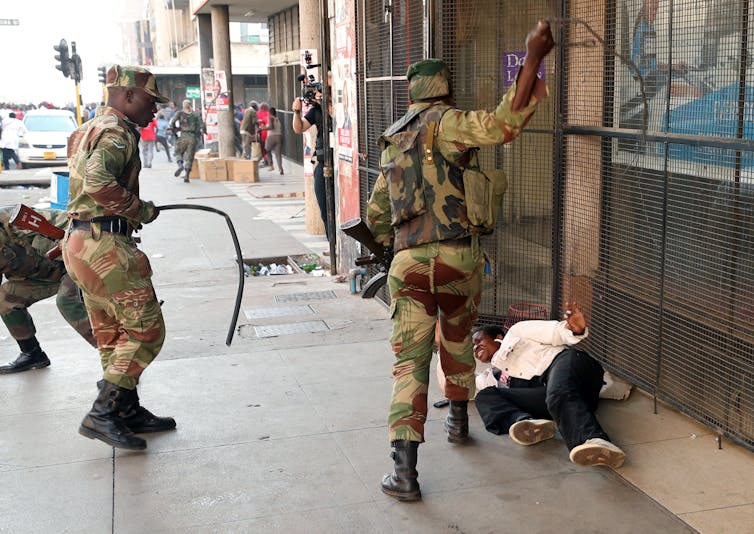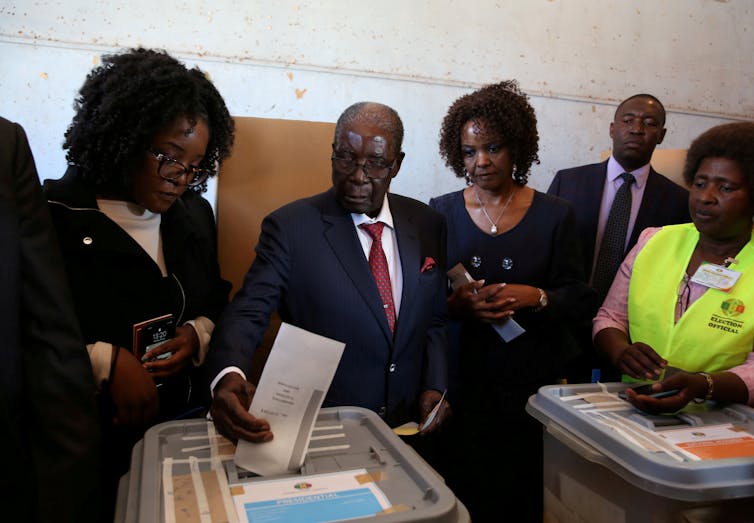Zimbabwe's coup did not create democracy from dictatorship
- Written by Steven Feldstein, Frank and Bethine Church Chair of Public Affairs & Associate Professor, School of Public Service, Boise State University
Many citizens and international observers cautiously hoped[1] that the southern African nation of Zimbabwe would find its way from dictatorship to democracy this year. President Robert Mugabe was militarily removed from office in November 2017 after 37 years in office[2], opening the door for the country’s first real leadership transition since 1980.
Elections were set for July 30. And, for the first time in many Zimbabweans’ lives, Mugabe was not on the ballot.
Election turnout was high, with over 70 percent of the country’s 16 million eligible voters participating. Zimbabweans waited in long lines[3] to choose between Mugabe’s replacement, the 75-year-old acting President Emmerson Mnangagwa, and a young lawyer named Nelson Chamisa who promised economic revival and political change[4].
“What everyone had hoped for was a turning of the page in Zimbabwe,” observed Michelle Gavin, an Africa specialist at the Council on Foreign Relations[5].
A quick crackdown
Election day was peaceful enough, but the high spirits wouldn’t last long.
After Chamisa’s party alleged fraud[6], the election commission said it would take days to finalize the vote count. When people in the capital of Harare protested the delay, police and soldiers fired, killing seven unarmed citizens[7].
On Aug. 2, the election commission declared Mnangagwa president[8] with 50.8 percent of the vote – just enough to avoid a run-off. Chamisa’s party rejected the results and, a week later, filed a legal challenge in court.
Mugabe was a violent, repressive ruler. And Mnangagwa – whose nickname is “the Crocodile” – was his vice president and enforcer[9]. In the weeks since the election, the government has ruthlessly cracked down on the opposition.
Police have beaten and arrested[10] dozens of Chamisa supporters, and groups of Mnangagwa’s backers have conducted house-to-house searches for opposition leaders.
 Soldiers in Harare, Zimbabwe’s capital, were quick to crack down on opposition supporters protesting delays in election results.
Reuters/Mike Hutchings[11]
Soldiers in Harare, Zimbabwe’s capital, were quick to crack down on opposition supporters protesting delays in election results.
Reuters/Mike Hutchings[11]
Tendai Biti, a well-known opposition figure, fled to Zambia, but was turned over by the Zambian government to Zimbabwe’s security forces. Mnangagwa’s government charged him with inciting public violence[12]. He was released on a US $5,000 bond only after a global outcry.
Today, Zimbabwe remains tense as it awaits the results of the court battle over the presidency[13]. Most observers expect Chamisa’s case will fail, and that Mnangagwa will officially be installed as Zimbabwe’s third president since 1963.
Mnangagwa’s political pantomime
Having spent considerable time studying Zimbabwe’s politics as a U.S. State Department official[14], I found the contested result and election-day violence saddening but not surprising.
Mnangagwa struck a conciliatory tone in the months leading up to the election. Declaring that Zimbabwe was “open for business[15],” he amended a law requiring local ownership of diamond and platinum mines. He signaled his intent to end farm seizures and vowed to sell off failing state enterprises.
He even wrote a New York Times op-ed[16] calling for democracy and equal rights for all citizens.
But Mnangagwa is tied to numerous human rights abuses, including overseeing a series of government-ordered massacres between 1982 and 1986 known as the “Gukurahundi[17].” An estimated 20,000 civilians from Zimbabwe’s Ndebele ethnic group were killed.
And behind his seemingly reasonable rhetoric, there were signs that Mnangagwa would stoop to win Zimbabwe’s election at any cost.
Human rights groups reported widespread voter intimidation[18], especially in rural areas, where the government deployed plainclothes security forces to “remind” people to vote – for Mnangagwa. Zimbabwe’s state-controlled media relentlessly broadcast pro-Mnangagwa messages.
And, according to civil society groups, the election commission kept the voter registration roll under wraps until it was too late[19] for voters who discovered their names were missing to re-register.
Electoral autocracy
Zimbabwe’s recent history mirrors a pattern familiar to other authoritarian countries undergoing a transition.
Research shows that authoritarian leaders almost always contend with two major political pressures[20]: challenges from within their regime, which rarely trigger a democratic transition[21], and popular challenges from outside the system, which might.
Mugabe succumbed to pressure from within his party last year after a succession battle between his wife, Grace, and Mnangagwa’s faction. The military settled this struggle decisively in November 2017, putting Mugabe under house arrest. Grace fled the country, and Mnangagwa was installed as acting president[22].
Once he assumed office, Mnangagwa worked resolutely to guarantee he could quash the next challenge facing him: popular opposition.
Even as he cited the importance of human rights and invited international observers to monitor Zimbabwe’s presidential election, he was methodically working with allies to lay a repressive groundwork[23] that would ensure he stayed in power as the standard-bearer of the ruling ZANU-PF party.
After the electoral commission announced his tenuous victory, Mnangagwa reacted in classic authoritarian fashion: he deployed police and military forces to repress street protests, driving would-be challengers into hiding.
Zimbabwe held an election without Mugabe. Unfortunately, all it got was another despot in Mugabe’s mold.
 Zimbabwe’s July 30 election was the first in four decades not to have Robert Mugabe, seen here casting his vote in Harare, on the ballot.
Reuters/Siphiwe Sibeko[24]
Zimbabwe’s July 30 election was the first in four decades not to have Robert Mugabe, seen here casting his vote in Harare, on the ballot.
Reuters/Siphiwe Sibeko[24]
What’s next for Zimbabwe
It wasn’t crazy to imagine things turning out differently.
Zimbabwe’s political system had actually been getting slightly more democratic in Mugabe’s final years. According to the Varieties of Democracy index[25], one of the world’s largest social science databases on democracy, Zimbabwe’s electoral system remains squarely in the “illiberal” category. But its score has improved 20 percent since 2007, particularly on freedom of expression.
The Economist Intelligence Unit’s Democracy Index[26] shows Zimbabwe making similar modest progress since 2006.
These small improvements in Zimbabwe’s political system, coupled with Mugabe’s demise, convinced some diplomats and experts[27] that the July 31 election might open the door for real democratic change rather than a continuation of electoral autocracy.
But recent events have confirmed that Mnangagwa and his allies did not force the ailing Robert Mugabe out of office to transform Zimbabwe’s political system. Rather, they sought to ensure their continued control over the nation.
After 38 years of authoritarian rule, one election simply does not create democracy from dictatorship.
References
- ^ cautiously hoped (theconversation.com)
- ^ after 37 years in office (theconversation.com)
- ^ long lines (www.seattletimes.com)
- ^ economic revival and political change (www.reuters.com)
- ^ Council on Foreign Relations (slate.com)
- ^ alleged fraud (time.com)
- ^ killing seven unarmed citizens (www.dw.com)
- ^ declared Mnangagwa president (www.bbc.com)
- ^ his vice president and enforcer (theconversation.com)
- ^ beaten and arrested (www.theguardian.com)
- ^ Reuters/Mike Hutchings (pictures.reuters.com)
- ^ charged him with inciting public violence (www.aljazeera.com)
- ^ court battle over the presidency (theconversation.com)
- ^ U.S. State Department official (zw.usembassy.gov)
- ^ open for business (www.reuters.com)
- ^ New York Times op-ed (www.nytimes.com)
- ^ Gukurahundi (www.theguardian.com)
- ^ widespread voter intimidation (www.foreignaffairs.com)
- ^ too late (www.theindependent.co.zw)
- ^ two major political pressures (www.cambridge.org)
- ^ rarely trigger a democratic transition (theconversation.com)
- ^ Mnangagwa was installed as acting president (allafrica.com)
- ^ lay a repressive groundwork (www.foreignaffairs.com)
- ^ Reuters/Siphiwe Sibeko (pictures.reuters.com)
- ^ Varieties of Democracy index (www.v-dem.net)
- ^ Economist Intelligence Unit’s Democracy Index (infographics.economist.com)
- ^ convinced some diplomats and experts (www.theguardian.com)
Authors: Steven Feldstein, Frank and Bethine Church Chair of Public Affairs & Associate Professor, School of Public Service, Boise State University
Read more http://theconversation.com/zimbabwes-coup-did-not-create-democracy-from-dictatorship-101510

